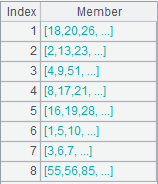P.align(n,y)
Description:
Perform alignment grouping on a record sequence.
Syntax:
P.align(n,y)
Note:
The function divides record sequence P into n groups according to grouping expression y and alignment succeeds if the result of y equals to the corresponding group number. The function is equivalent to P.align(to(n),y).
Parameter:
|
P |
A record sequence. |
|
n |
An integer, which is the number of groups. |
|
y |
An expression whose result is an integer. |
Option:
|
@a |
Return all members for each group, where members form a sequence; the function by default returns only the first eligible member for each group. |
|
@r |
With this option, parameter y is an integer sequence. |
|
@p |
Return values that are sequence numbers of members of P. |
Return value:
Sequence
Example:
When parameter y is an integer:
|
|
A |
|
|
1 |
=demo.query("select * from FAMILY") |
|
|
2 |
=A1.align(11,EID) |
Divide A1’s record sequence into 11 groups according to EID values, which correspond to group numbers one by one, and return the first eligible member for each group.
|
|
3 |
=A1.align@a(11,EID) |
Divide A1’s record sequence into 11 groups according to EID values, which correspond to group numbers one by one, and, as @a is present, return all eligible members for each group.
|
|
4 |
=A1.align@ap(11,EID) |
As @p is present, return values that are sequence numbers of EID values in A1.
|
When parameter y is an integer sequence:
|
|
A |
|
|
1 |
=demo.query("select EID,NAME,DEPT from EMPLOYEE") |
|
|
2 |
=demo.query("select * from DEPARTMENT") |
|
|
3 |
=A1.derive(A2.pselect@a(DEPT==A1.DEPT): DeptNo) |
Find sequence numbers of DEPARTMENT records corresponding to EMPLOYEE table and then form them into an integer sequence and store it in DeptNo field.
|
|
4 |
=A3.align@r(8,DeptNo) |
Align records directly to group number according to DeptNo field.
|
|
5 |
=A3.align@rp(8,DeptNo) |
As @p option is present, return sequence numbers of records.
|








